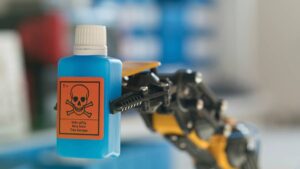Australia’s surging space sector gets major boost as Microsoft becomes ‘Constellation Partner’

Microsoft has joined forces with the National Space Industry Hub, which was delivered by Cicada Innovations
- Australia’s space industry is moving rapidly
- Microsoft has joined forces with the National Space Industry Hub (NSIH)
- NSIH was delivered by Sydney-based incubator Cicada Innovations
With rapidly declining costs and advances in technology, the global space industry is bursting at the seams.
While NASA still remains the most well funded space agency in the world, billions are pouring into the private sector, making it one of the hottest investment opportunities out there.
According to Morgan Stanley, the revenue generated by the global space industry may rise to more than $1 trillion by 2040.
A lot of the action is predictably happening in the US, with companies like SpaceX, Virgin Galactic and Blue Origin grabbing most of the headlines.
But Australia also has a burgeoning space scene, and local space startups here are making giant leaps recently.
Sydney-based incubator Cicada Innovations is right in the midst of the action. Working at the forefront of innovation, Cicada supports ventures seeking to create life-changing technology by applying cutting-edge science.
In February, Cicada, with support from the NSW Government, delivered and launched the National Space Industry Hub (NSIH) in Eveleigh, Sydney.
The Space Hub residency is open for startups who wish to be based within Cicada’s deep tech incubator.
It also offers resources, mentoring and connections for emerging space ventures, as well as bringing together industry and researchers to ensure we’re at the forefront of this highly competitive industry.
The NSIH received a major boost recently after Microsoft was announced as its first ‘Constellation Partner’.
Microsoft will be the exclusive Constellation Partner for NSIH in the ‘cloud technology’ category.
The global giant is expected to invest its time, capabilities and human capital in the innovators, entrepreneurs, and researchers who form the NSIH community.
Building a thriving space industry
The NSIH Constellation Partners Program was especially designed to engage industry and foster investment in the local space industry.
Microsoft’s involvement will allow NSIH to expand its national programs and become sustainable over the long term, following initial funding from the NSW Government.
The global giant is expected to contribute in enhancing NSIH’s commercialisation programs, including through events and workshops, free technology credits for participants, and mentoring.
NSIH members will be supported by Microsoft technology advisors and Microsoft Azure Space engineers as they build their solutions for commercial use.
Sally-Ann Williams, CEO of Cicada Innovations, said that strengthening ties between space innovators and industry will be critical for building a local space industry that is globally competitive.
“To build a thriving Australian space industry, we need a constellation of organisations that are values- and vision-aligned, including pioneering companies like Microsoft that are investing in, supporting, and building new frontiers,” she said.
What Microsoft brings to the table
Microsoft’s decision to partner with NSIH reflects the US giant’s approach and strategy to making space accessible and affordable.
The company aims to integrate its powerful Azure cloud platform with an ecosystem of space partners around the world in order to develop a multi-orbit, multi-band, multi-vendor, cloud-enabled capability.
The partnership with the NSIH follows several other recent initiatives by Microsoft Australia to power the growth of the local space industry.
In August last year, the Microsoft for Space Startups Australia program was launched to support emerging enterprises focused on cloud-powered innovation, on and off the planet.
That was followed up in September by a ground-breaking collaboration with Nokia and the Government of South Australia to innovate on space technology and 5G telecommunications.
In the same month, Microsoft also signed an MoU with the Australian Institute for Machine Learning to jointly explore how advanced cloud computing, artificial intelligence (AI), and computer vision can be applied in space.
It’s also currently working with the CSIRO on an initiative to use AI, space technology, and cloud capabilities to track feral buffalo.
Lynn McDonald, Azure Space Lead at Microsoft Australia, said that Microsoft is ready and willing to become partners with Australia’s space startups.
“Microsoft is proud to be supporting the National Space Industry Hub, delivered by Cicada Innovations,” McDonald said.
“We’re seeing important and cutting-edge innovation in Australian space startups, and we want to enable, support and accelerate their journey.
“We are very excited about the calibre of early-stage space tech innovations being built and commercialised. This partnership will help catalyse further industry engagement, and investment into building the Australian space industry.”
Cicada as a top incubator
Since its inception more than two decades ago, Cicada has seen an unprecedented $1.3 billion in exits from six deep tech ventures, and has helped over 300 companies raise more than $1.3 billion in funding.
It has twice been named the ‘Top Incubator in the World’ by the International Business Innovation Association, and has delivered commercialisation training to thousands working in the science and technology sectors.
Cicada believes that space is a crucial and extremely important industry, but is very competitive at the same time.
“To be globally competitive in the space industry, Australian organisations need to work collaboratively in the pursuit of a thriving ecosystem,” Williams said.
“Initiatives like the National Space Industry Hub, with the support of industry partners like Microsoft, are critical to this.
“The space industry is not just incredibly important in the current economic climate.
“It is a huge growth industry that will only continue to grow, especially because it forms a vital part of the supply chain for so many other industries here on Earth,” said Williams.
Related Topics
UNLOCK INSIGHTS
Discover the untold stories of emerging ASX stocks.
Daily news and expert analysis, it's free to subscribe.
By proceeding, you confirm you understand that we handle personal information in accordance with our Privacy Policy.








